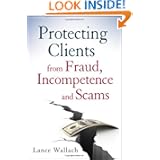Lance Wallach
National Society of Accountants Speaker of the Year and member of the AICPA faculty of teaching professionals, Wallach is a frequent speaker on retirement plans, financial and estate planning, and abusive tax shelters.
He is also a featured writer and has been interviewed on television and financial talk shows including NBC, National Pubic Radio's All Things Considered and others,Lance authored Protecting Clients from Fraud, Incompetence and Scams published by John Wiley and Sons, Bisk education's CPA's Guide to Life Insurance and Federal Estate and Gift Taxation,
as well as AICPA best-selling books including
Avoiding Circular 230 Malpractice Trap.
Testimonials...
"Mr. Wallach, thanks so much for taking the
time to talk to me ..today about VEBAs.
Any information you can send me would be
helpful. Hopefully, we can work together in
the future as interest in VEBAs increase."
Corman G. Franklin
Office of the Assistant Secretary for Policy
U.S. Department of Labor

Protect your clients – and yourself – from all kinds of financial chicanery and stupidity with this vital new book
It doesn't matter if a financial error was made because of malice or ignorance – the end result is that you lose money. Luckily, you don't have to sit idly and take it. If you have Protecting Clients from Fraud, Incompetence and Scams, you can identify and avoid the dysfunctional sectors of the financial industry, steer clear of the fallout from the Madoff Era, and guide your clients to real, healthy, sustainable returns. This powerful book
- Pinpoints dysfunctional sectors within the financial industry and offers advice against frauds and scammers
- Shows how a team approach to asset management can ward off financial predators
- Offers practical strategies and tools to combat client risk for Risk and Asset Management
Offering insightful information to protect your clients from all sorts of frauds and incompetence, this essential guide equips you with tips and techniques to spot the red flags of fraud and prevent it before it starts.
 IRS Secrets You Should Know
Including
Tax, Insurance, and Cost Reduction Strategies for Small Business
Just one of these ideas from the book will save you thousands:
IRS red flags and how to audit proof your tax return
Why your retirement plan is an audit target: how to upgrade it
The only way to deduct estate and business succession plan costs
Turn your life insurance into a tax deduction
Reduce health insurance, workers’ comp and other insurance costs
Discover the only deductible benefit plan where money comes out tax free, even before retirement
Protect assets from creditors while obtaining a tax deduction
Why the IRS has turned your accountant into a tax collector, and what to do about this
Seven best new tax reduction ideas
Use a captive insurance company to reduce taxes and costs
And much more!!!
IRS Secrets You Should Know
Including
Tax, Insurance, and Cost Reduction Strategies for Small Business
Just one of these ideas from the book will save you thousands:
IRS red flags and how to audit proof your tax return
Why your retirement plan is an audit target: how to upgrade it
The only way to deduct estate and business succession plan costs
Turn your life insurance into a tax deduction
Reduce health insurance, workers’ comp and other insurance costs
Discover the only deductible benefit plan where money comes out tax free, even before retirement
Protect assets from creditors while obtaining a tax deduction
Why the IRS has turned your accountant into a tax collector, and what to do about this
Seven best new tax reduction ideas
Use a captive insurance company to reduce taxes and costs
And much more!!!
Books can be purchased here
Amazon.com: Lance Wallach: Books, Biography, Blog, Audiobooks, Kindle

